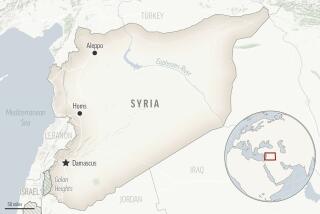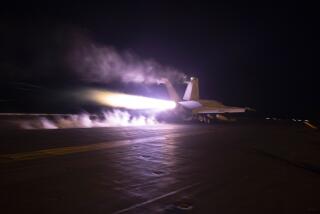In Yemen and Syria, 25 slain as violence continues
Violence claimed more lives in Yemen and Syria on Friday as the countries’ autocratic regimes again turned to military power to quell months-long popular uprisings.
In Yemen, as many as 17 people were killed by government airstrikes near Nahm, northeast of the capital, Sana, after opposition fighters stormed a strategic Republican Guard base, according to unofficial tallies. Members of the Bakil tribe attacked the base after a sheik who had been sent to negotiate an end to fighting in Sana was killed by forces loyal to President Ali Abdullah Saleh.
The killings came as a truce was announced in Sana between government forces and the main opposition group.
In Syria, security forces loyal to President Bashar Assad opened fire on protesters in several locations, killing at least three in Qatana, four in Dael and one in Zabadani near the border with Lebanon, according to protest organizers and human rights activists. Protests also attracted hundreds of demonstrators in Damascus, the capital, and the cities of Baniyas and Homs, organizers said.
The fighting between government forces and demonstrators that started months ago continued in many locations despite international calls to stop the bloodshed.
The Syrian clashes came on “Homeland Protector Friday,” which involved demonstrators calling on the army to stand with the people, according to activists.
A witness in Homs said security forces in civilian clothes fired on a gathering of more than 2,000 demonstrators.
“The regime must go — there is no other way out,” the witness said.
In striking contrast, the Yemeni capital was calm after four days of clashes between Saleh’s troops and supporters of Sadiq Ahmar, head of the powerful Hashid tribe. The fighting in Sana had largely ended the previous day and a truce was announced at Friday’s antigovernment rally.
Saleh had launched an all-out fight with Ahmar’s supporters on Monday, one day after the president refused to sign a transfer-of-power agreement calling for him to leave office in 30 days, with immunity. Saleh’s troops shelled Ahmar’s expansive villa in Sana on Tuesday, killing Bakil tribal sheik Muhammad bin Muhammad Abdullah abu Lahum, who was on a mission to end the fighting.
“Nahm had been involved in fighting before, but certainly Abu Lahum’s death raised the stakes,” said Yemen specialist Gregory Johnsen of Princeton University. “The more tribes and groups that get sucked into the fighting, the greater the danger of civil war becomes.”
The terms of the cease-fire, reached between Ahmar and Saleh, appeared to involve Ahmar’s men being handed back control of the district of Hasaba. Armed tribesmen now man checkpoints around the northern district, replacing the government troops who held control on Thursday.
For the first time in months, Saleh did not address a rally of his supporters Friday. His refusal to step down stands in contrast to the decisions this winter by the leaders of Tunisia and Egypt, who left office in the face of popular protests.
Special correspondents Craig reported from Sana and Sandels from Beirut. Times staff writer Ned Parker in Baghdad contributed to this report.
More to Read
Start your day right
Sign up for Essential California for news, features and recommendations from the L.A. Times and beyond in your inbox six days a week.
You may occasionally receive promotional content from the Los Angeles Times.






